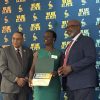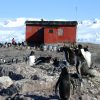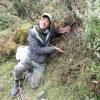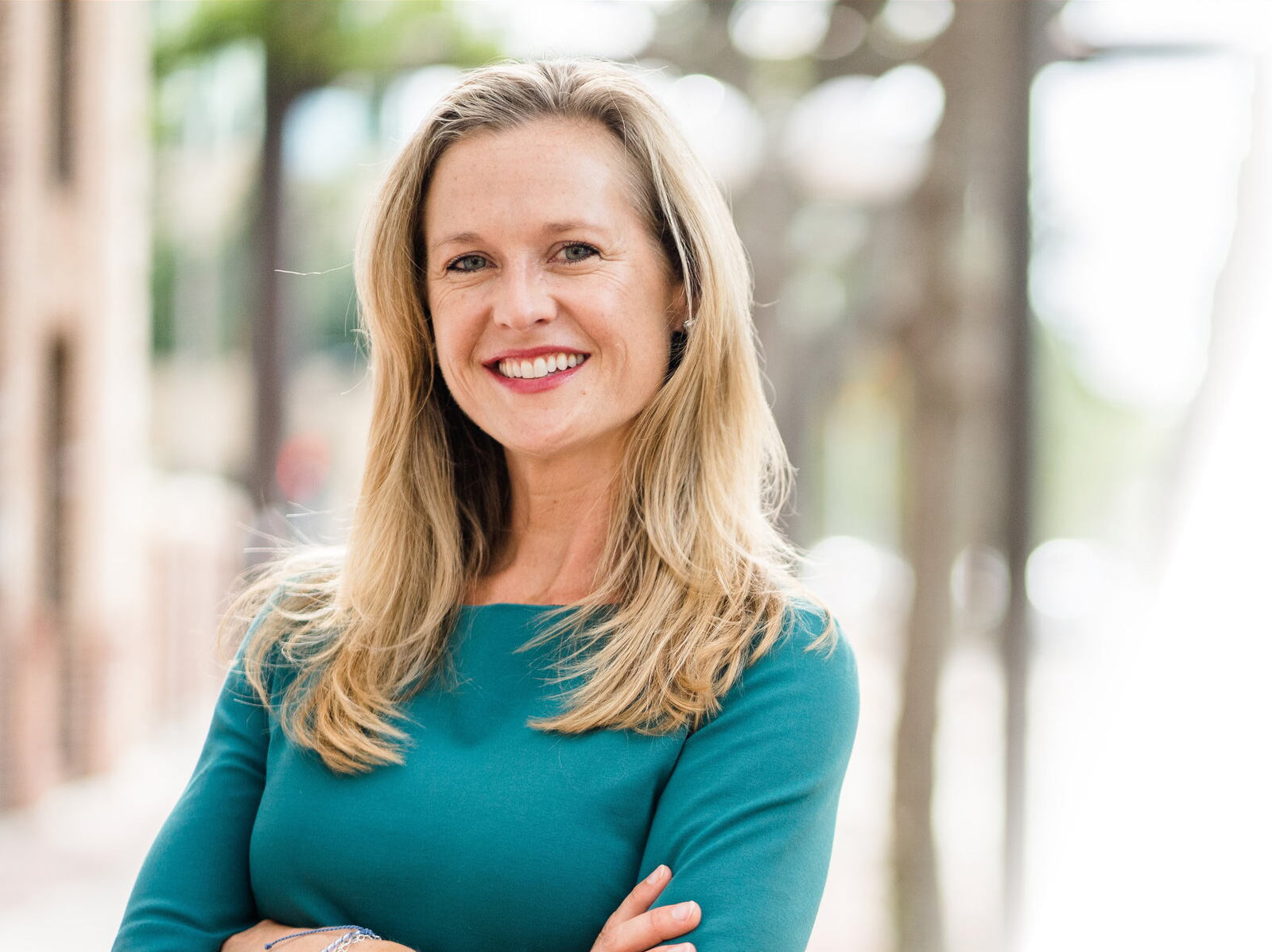
Florida Representative Cross is working to address policy gaps she has observed in Florida’s legislation, specifically concerning the environment. Photos courtesy Lindsay Cross
State Representative Lindsay Cross flexed her biceps with a grin as Eckerd College Political Science Professor Tony Brunello, Ph.D., introduced her as a political hero in the state of Florida. The Democratic representative was elected in 2022, and Eckerd alumnus Will Shedden ’21 was her campaign manager and serves as her legislative aide. Her environmental interest stems from her previous career as an environmental scientist.
During her first fiscal year in office, Rep. Cross advocated for bills that protect the beauty of Florida’s ecosystems. She began her speech at Eckerd’s Dan and Mary Miller Auditorium on Sept. 27 by explaining how a bill becomes a law. She mentioned that Democrats are currently a super minority in the house, meaning they don’t have the votes to stop “egregious bills” or to pass more positive legislation.
She discussed many of the policy gaps she has observed in Florida’s legislation, specifically concerning the environment. As a state, Florida doesn’t have any renewable energy goals. Rep. Cross is working to change that. Moving away from fossil fuels as an energy source would serve to protect wildlife such as corals, Florida panthers, black bears and, of course, our beloved manatees. She also is concerned about moves to use phosphate rock in road construction. The traces of Radon 226 in these compounds could have serious human health implications.
Senior marine science student Alexis Vargas, from Sarasota, Florida, was excited to hear from a house representative on this issue. She said this portion of Cross’s speech was the most impactful for her because it related directly to the content of her courses and her research. “It’s cool that she’s a scientist first, because she knows things most politicians wouldn’t know,” Alexis said. “She has the knowledge to actually combat these issues.”
Sea level rise is another major concern for people living in Cross’s district, which includes parts of Pinellas County. There is a lot of vulnerability in these areas, and Cross is looking for ways to protect the people in our communities. She doesn’t want to read stories about her constituents like the ones told in Elizabeth Rush’s Rising: Dispatches from the New American Shore—Eckerd’s Summer Reading book this year.
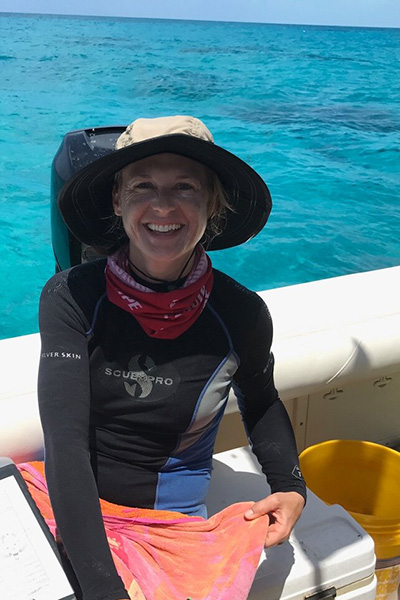
Florida Rep. Cross’s environmental interest stems from her previous career as an environmental scientist.
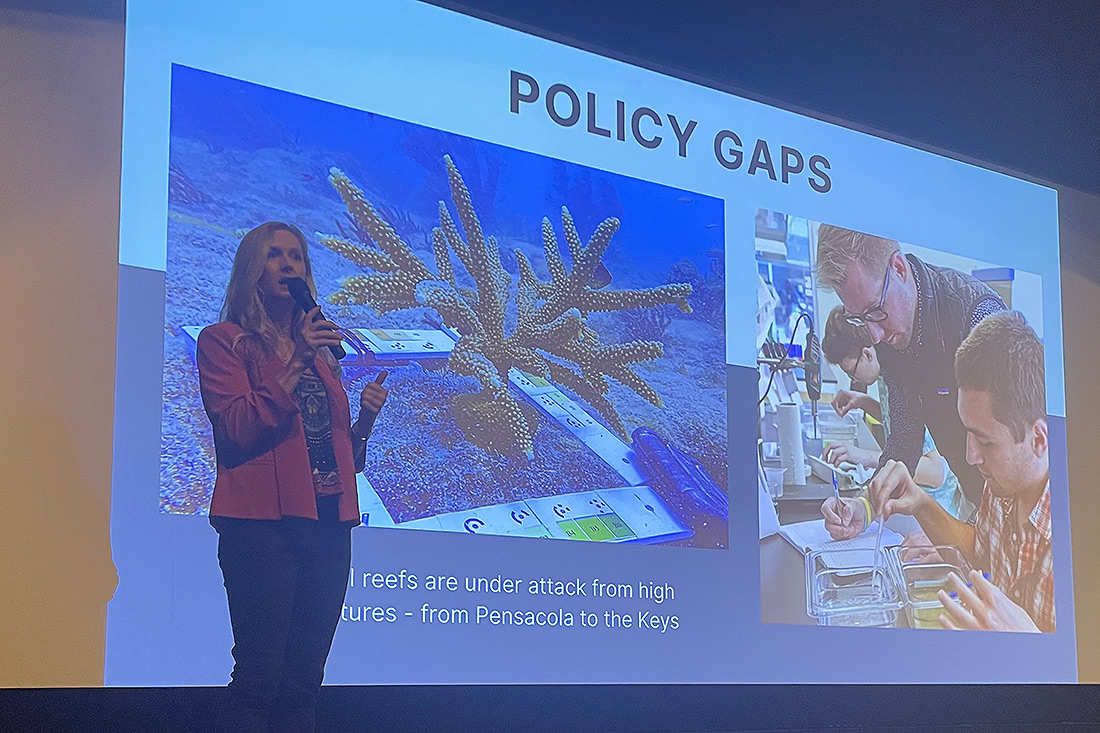
On-stage at Miller Auditorium; photo by Will Shedden ’21
Rep. Cross applauded the work Eckerd is doing to prepare for the future. Its award-winning Resiliency Framework Plan employs strategies she hopes to see in many communities across the state in coming years.
“You guys are incredibly lucky to be here,” Cross said of the College’s bayfront campus. “Let’s work to protect it.”
She is working toward legislation that will make preventions such as raised buildings and walkways more accessible to vulnerable communities. This work was started by the Resilient Florida Grant Program that provides funding for some of these projects. This is a great step forward, and Cross hopes to utilize some of its momentum for further success.
Kattey Pass, a senior marine science student from Indianapolis, said she was impressed by Cross’s ability to communicate science to the public. “It’s helpful that she’s young,” Kattey noted. “It’s so great that she was willing to come talk to us, especially in such an important role.”
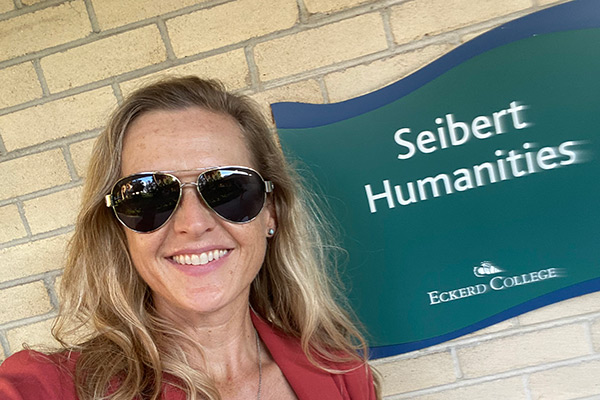
Florida Rep. Cross on the Eckerd College campus
Kattey is interested in learning more about how to effectively communicate scientific principles in a way that makes a difference. She is looking for avenues where she can talk about her research that could impact environmental policy, because scientific papers with 80-plus pages aren’t a practical way to share information.
To answer the question “What can you do?” Cross gave students and St. Petersburg locals three practical steps to take: Organize lobby days, vote and make choices that are planet-positive.
She reminded the audience of their right to have their voices heard. Citizens can get involved as lobbyists or advocates to affect decisions in Tallahassee. As demonstrated in Rising, it’s often personal stories, not scientific statistics, that make the biggest difference.
Cross thanked campus organizations such as the Public Interest Research Group Students for advocating strongly for voting rights and widespread voter registration. House representatives have to campaign every two years for reelection, so it’s important for community members to be educated and informed on these kinds of issues.
As far as personal choices, Cross said there are always things we can do to decrease our negative impact on our local ecosystems. But it’s also important that the responsibility for change falls equally on the public and the system.
“Right now, we have a system that favors fossil fuels. Your choice not to use a plastic bag is great but isn’t the only solution to this massive problem that affects all of us,” she said. “Change will come with the system.”







